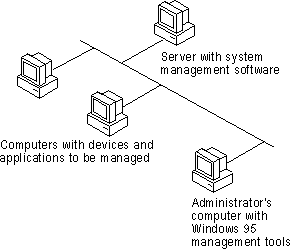
The system management tools and agents provided with Windows 95 support system management for three management areas:
Windows 95 provides Registry-based support for remote management of configuration settings for hardware and software settings — either on individual computers or (through system policies) on multiple computers on the network. In addition, the Windows 95 compact disc includes agents for remote system administration using other management software.
The following summarizes the important features in Windows 95 that support system management on corporate networks.
Security for system logon and resource access.
The administrator can take advantage of centralized user accounts on Windows NT or Novell® NetWare® networks to restrict network logon and access to shared resources on computers running Windows 95. Windows 95 provides password caching to make it easier for users to manage connections to password-protected resources, yet also allows network administrators to restrict users' capabilities and, consequently, enforce strict security policies. For information, see Chapter 14, "Security."
User profiles.
When user profiles are enabled, individual users, desktop configurations are available wherever they log on to the network. This solution permits multiple users to share one computer and "roving" users to log on to other networked computers while maintaining their personal settings. Administrators can also enforce a "mandatory" user profile, which can be useful for managing a common desktop for novice users. For information, see Chapter 15, "User Profiles and System Policies."
System policies.
The administrator can use system policies to specify required system settings and to restrict network access, security privileges, and system settings from a convenient central source. Policies can be specified for groups, for specific users, and for multiple computers, providing administrators significant control over users' ability to configure computer and desktop settings. For information, see Chapter 15, "User Profiles and System Policies."
Remote administration.
Built-in capabilities for remote administration assist administrators in managing networking computers from a central location, reducing the burden of supporting system configuration and troubleshooting on the corporate network. For information, see Chapter 16, "Remote Administration."
Backup capabilities.
Backup agents used with Windows 95 support network-based data backup without requiring user intervention. Windows 95 includes network backup agents from Arcada and Cheyenne. For information, see Chapter 16, "Remote Administration."
System administration agents.
The Windows 95 compact disc includes agents that run as services for use with system management products from various vendors, including Microsoft Systems Management Server, HP® Openview, Intel® LANDesk™, IBM® LAN NetView®, Sun® NetManager, and Novell NMS. For information, see Chapter 16, "Remote Administration."
Windows 95 Registry.
In Windows 95, the operating system collects information about the hardware, system configuration settings, and applications and stores it in the Registry. The Windows 95 Registry is a structured database that consolidates configuration and status information for hardware and software components. As a result, this information is available to system management applications ensuring flexible system management capabilities.
